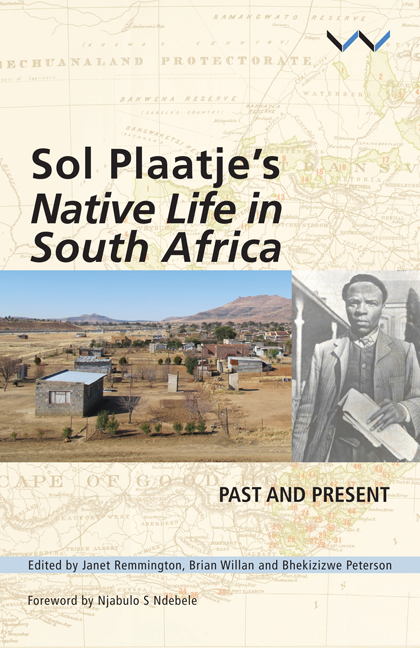Book contents
- Frontmatter
- Table of Contents
- Acknowledgements
- Foreword: Sol T Plaatje and the ‘power of all’
- Introduction: Native Life in South Africa – then and now
- Editions of Native Life in South Africa: 1916 to the present
- Looking Back: Foreword to Ravan Press edition of Native Life in South Africa, 1982
- Poetic Tributes
- A Contemporary Reimagining: The Road to Dikhudung
- Contributors
- Plaatje Resources
- List of Figures
- Index
A Contemporary Reimagining: The Road to Dikhudung
Published online by Cambridge University Press: 21 April 2018
- Frontmatter
- Table of Contents
- Acknowledgements
- Foreword: Sol T Plaatje and the ‘power of all’
- Introduction: Native Life in South Africa – then and now
- Editions of Native Life in South Africa: 1916 to the present
- Looking Back: Foreword to Ravan Press edition of Native Life in South Africa, 1982
- Poetic Tributes
- A Contemporary Reimagining: The Road to Dikhudung
- Contributors
- Plaatje Resources
- List of Figures
- Index
Summary
Ramothibi woke up a vagabond that day. Not that he woke up – the poor man had not even shut one eye since going to bed the previous night. His mind had been wandering since the day he was told about the new land law. A very cruel law, he said.
Piet told him straight in the eye that come June the twentieth, things are going to change.
‘Baas,’ he said. Master. ‘You and I have known each other for many years. Why would a law change the way we have been living?’
‘The law is the law, Ramothibi. If I don't apply it they'll throw me in jail,’ Piet said, and shrugged his shoulders.
When Piet called him by his name he knew things had changed. From the days when they were children Piet had called him Rams. Never Ramothibi. ‘Jehova Mmabaledi!’ Ramothibi called God the saviour.
Can't a friendship that began in childhood and has survived all manner of things survive this cruel law too? Ramothibi could not stop thinking how he grew up playing with Piet and how later he became the only black man in Hemel op Aarde to sit with Piet in his living room to drink coffee. There were times when Ramothibi thought that the farm was indeed heaven on earth as its Dutch name suggested.
Piet had no other friends to talk to about his first love. Not even neighbouring farmers’ sons. Ramothibi was there to listen and he knew everything there was to know about the whole Botman family, from the oldest to the youngest.
He had seen and heard everything. All that time there was no hint that one day a law would be passed and change everything, including relationships that are deep and strong enough to survive all tests. Perhaps the new land law was a new and unknown test.
Ramothibi's ancestors’ bones lay buried on Piet's farm. At least Piet gave him the permission to visit the graves whenever he wanted to. ‘You can even perform those rituals of yours here,’ Piet said.
But that was not enough; Ramothibi felt like he was about to have an umbilical cord severed and thrown to the dogs.
- Type
- Chapter
- Information
- Sol Plaatje's Native Life in South AfricaPast and Present, pp. 233 - 242Publisher: Wits University PressPrint publication year: 2016



